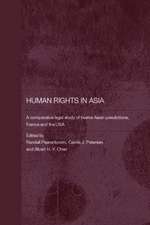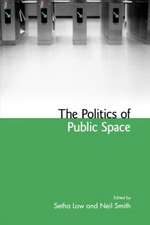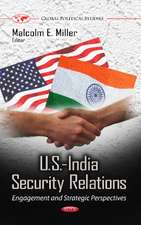Routledge Handbook of Corruption in Asia
Editat de Ting Gong, Ian Scotten Limba Engleză Hardback – 5 dec 2016
The Routledge Handbook of Corruption in Asia addresses the theories, issues and trends in corruption and anticorruption reform that have emerged from this diverse experience. The book is divided into four major parts: corruption and the state; corruption and economic development; corruption and society; and controlling corruption: strategies, successes and failures. Chapters compare and contrast corruption in different social and institutional contexts, examine both successful and unsuccessful attempts to control it, and consider what lessons can be drawn from these Asian experiences.
This academically rigorous and insightful book will be of interest to a wide range of students and scholars, particularly those of Asian studies, politics and sociology.
Preț: 1243.91 lei
Preț vechi: 1963.88 lei
-37% Nou
Puncte Express: 1866
Preț estimativ în valută:
238.05€ • 247.61$ • 196.53£
238.05€ • 247.61$ • 196.53£
Carte tipărită la comandă
Livrare economică 14-28 aprilie
Preluare comenzi: 021 569.72.76
Specificații
ISBN-13: 9781138860162
ISBN-10: 1138860166
Pagini: 360
Ilustrații: 46
Dimensiuni: 174 x 246 mm
Greutate: 0.82 kg
Ediția:1
Editura: Taylor & Francis
Colecția Routledge
Locul publicării:Oxford, United Kingdom
ISBN-10: 1138860166
Pagini: 360
Ilustrații: 46
Dimensiuni: 174 x 246 mm
Greutate: 0.82 kg
Ediția:1
Editura: Taylor & Francis
Colecția Routledge
Locul publicării:Oxford, United Kingdom
Public țintă
Postgraduate and UndergraduateCuprins
1. Introduction
Part I: Corruption and the State
2. Institutional corruption and the state in Asia
3. Corruption networks in China: an institutional analysis
4. Two steps forward, one step backwards: Indonesia’s winding (anti-) corruption journey
5. "Normal" corruption in Japan
6. Rule making and rule breaking: electoral corruption in East Asia
Part II: Corruption and Economic Development
7. Corruption in Asia: trust and economic development
8. Corruption and inequality in Asiau
9. Corruption and procurement in Asian states
10. Bribes and taxes: spatially concentrated or randomly distributed? Evidence from three sources of firm level data in Vietnam
11. Regulatory capture as a two-way street: Hong Kong small and medium enterprises in the Pearl River Delta
Part III: Corruption and Society
12. Thinking about corruption as though people mattered
13. Corruption and collective protest in China
14. Civil society and anti-corruption initiatives in India: towards a citizen’s perspective
15. Women and corruption: when being the fairer sex becomes a myth
16. Measuring public perceptions of corruption in Asia
Part IV: Controlling Corruption: Strategies, Successes and Failures
17. Controlling corruption in Asian countries: the elusive search for success
18. Corruption prevention: successful cases
19. Rule-based and integrity-based anti-corruption approaches in Asia
20. Regional anti-corruption initiatives in Asia
Part I: Corruption and the State
2. Institutional corruption and the state in Asia
3. Corruption networks in China: an institutional analysis
4. Two steps forward, one step backwards: Indonesia’s winding (anti-) corruption journey
5. "Normal" corruption in Japan
6. Rule making and rule breaking: electoral corruption in East Asia
Part II: Corruption and Economic Development
7. Corruption in Asia: trust and economic development
8. Corruption and inequality in Asiau
9. Corruption and procurement in Asian states
10. Bribes and taxes: spatially concentrated or randomly distributed? Evidence from three sources of firm level data in Vietnam
11. Regulatory capture as a two-way street: Hong Kong small and medium enterprises in the Pearl River Delta
Part III: Corruption and Society
12. Thinking about corruption as though people mattered
13. Corruption and collective protest in China
14. Civil society and anti-corruption initiatives in India: towards a citizen’s perspective
15. Women and corruption: when being the fairer sex becomes a myth
16. Measuring public perceptions of corruption in Asia
Part IV: Controlling Corruption: Strategies, Successes and Failures
17. Controlling corruption in Asian countries: the elusive search for success
18. Corruption prevention: successful cases
19. Rule-based and integrity-based anti-corruption approaches in Asia
20. Regional anti-corruption initiatives in Asia
Notă biografică
Ting Gong is Professor in the Department of Public Policy, City University of Hong Kong.
Ian Scott is Visiting Professor in the Department of Public Policy at the City University of Hong Kong and Emeritus Professor at Murdoch University in Perth, Australia.
Ian Scott is Visiting Professor in the Department of Public Policy at the City University of Hong Kong and Emeritus Professor at Murdoch University in Perth, Australia.
Descriere
This book addresses the theories, issues, and trends in corruption and anticorruption reform that have emerged from the diverse experience of Asia. The book is divided into four major parts: corruption and the state; corruption and economic development; corruption and society; and controlling corruption: strategies, successes and failures. Chapters will compare and contrast corruption in different social and institutional contexts, examine both successful and unsuccessful attempts to control it, and consider what lessons can be drawn from these Asian experiences.














